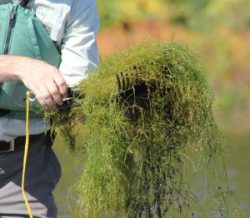The clean, clear beauty of Northern Michigan’s lakes and streams are threatened. Non-native plants and animals invading our waters can change water quality and really interfere with the fun of swimming, boating, fishing, kayaking, paddle-boarding and more. To protect the water quality and recreational potential of our lakes and streams, we must prevent the entry and spread of invasive plants and animals.

Last fall, Jane Perrino introduced Nature Change viewers to a new program being operated by the Benzie Conservation District (BCD). Here’s a link to that page on Nature Change. Using a traveling power washing system, Perrino and a handful of volunteers moved from boat launch to boat launch in a three-county area to teach boaters and freshwater enthusiasts how to prevent the spread of invasive species.
In this video, we join BCD’s Perrino for a short discussion with her friend and mentor, Dr. Jo Latimore. An aquatic ecologist with Michigan State University, Latimore is a statewide leader in efforts to control the spread of aquatic invasive species. She has been instrumental in the development of efforts to educate boaters across the state in methods for stopping the movement of invasive species.

Perrino and Latimore got together in the showroom of McDonald Marine in Frankfort to emphasize the role every boater plays in protecting the water quality of Michigan’s lakes and streams. With cameras rolling, these two experts describe the threats invasive species pose – including some really bad actors migrating north by hitching rides on boat trailers and propellers, attached to hulls and others locations on boats, kayaks, paddle boards and other watercraft. As Latimore points out, starry stonewort algae is one of the most serious threats heading north, but it can be stopped by vigilant boaters.
As demonstrated by programs run by the Benzie Conservation District, Michigan State University and others, power washers are very effective at getting rid of unwanted plants and animals hitchhiking on boats of all kinds. Many of these programs depend on the help of volunteers to operate the washers and spread the word. All boaters need to take the time to clean, drain and dry their watercraft before moving to a new water body.
To learn how to host a free boat washing event in Benzie, Grand Traverse, Leelanau or Manistee counties, contact Jane Perrino, the Aquatic Invasive Species Coordinator for BCD. Other counties may be able to participate in Michigan State University’s statewide Mobile Boat Wash program, supported by the Michigan Department of Environmental Quality and the US Forest Service. Learn more about MSU’s program on their flyer and Facebook page.
Editor’s Note: The Aquatic Invasive Species Pathways Project is funded in part through the Michigan Invasive Species Grant Program, a collaboration between the Michigan departments of Environmental Quality, Natural Resources & Agriculture and Rural Development.

